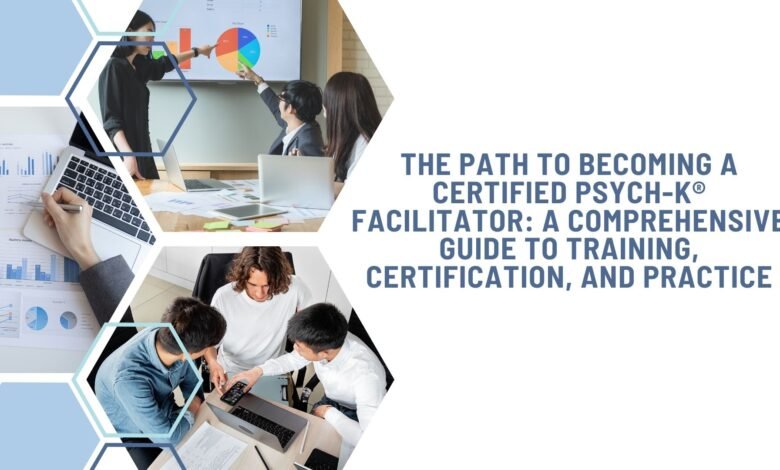The Path to Becoming a Certified PSYCH-K® Facilitator: A Comprehensive Guide to Training, Certification, and Practice

Embarking on the journey to become a certified PSYCH-K® facilitator is a profound and rewarding endeavor. The certification process empowers individuals to guide others in transforming limiting beliefs, enhancing personal well-being, and fostering a life of alignment and resilience. This guide explores the path to certification, from the initial training to the rewarding practice of facilitating growth and change for clients.
What is PSYCH-K®?
PSYCH-K® is a unique, non-invasive process that facilitates rapid change by aligning subconscious beliefs with conscious goals. Developed by Robert M. Williams in the 1980s, PSYCH-K® combines psychological principles, spiritual elements, and neuroscience to create shifts in beliefs, particularly those that hold individuals back from reaching their potential. By using simple but profound techniques, PSYCH-K® works directly with the subconscious to reprogram limiting beliefs into supportive ones, thereby creating lasting change.
Step 1: Exploring the PSYCH-K® Basics Workshop
The PSYCH-K® Basics Workshop is the foundational course for anyone interested in learning and applying the method. Whether you’re interested in personal development or aspire to become a facilitator, the Basics Workshop provides core principles and techniques for working with subconscious beliefs.
- Course Content: The Basics Workshop covers muscle testing, “Balances” (the processes used to create subconscious change), and techniques for working with oneself and others. Participants learn key PSYCH-K® tools, including the New Direction and Resolution Balance techniques, which form the foundation of PSYCH-K®.
- Duration: This workshop generally spans two to three days, with opportunities for hands-on practice and guidance from certified instructors.
- Outcome: Upon completing this workshop, participants gain a foundational understanding of PSYCH-K® tools and techniques and can start using them for self-help or assisting family and friends.
While this workshop alone does not certify someone as a PSYCH-K® facilitator, it’s a crucial first step toward deepening one’s understanding and potential for facilitating.
Step 2: Continuing Education through the PSYCH-K® Advanced Integration Workshop
The PSYCH-K® Advanced Integration Workshop is a critical component for those pursuing certification. This workshop builds on the foundational concepts learned in the Basics Workshop and introduces advanced techniques that allow facilitators to address more complex issues and refine their skills.
- Course Content: In this advanced course, participants dive into four additional Balances, including the Core Belief Balance, Relationship Balance, Life Bonding Balance, and Surrogation. These techniques enable facilitators to work with deeper patterns, trauma, and relationship issues and even assist individuals who are not physically present.
- Duration: Typically, the Advanced Integration Workshop is a four-day course, providing a more intensive learning experience.
- Outcome: After this workshop, participants gain proficiency in a broader range of tools and approaches, making them better equipped to support clients on their journey of transformation.
Step 3: Specialized PSYCH-K® Workshops
Beyond the Basics and Advanced workshops, aspiring facilitators can pursue specialized PSYCH-K® training to build niche skills, which can enhance their practice and enable them to address a diverse array of client needs.
- Health and Wellness Program: This program emphasizes the link between physical and mental well-being, offering techniques specifically designed to address health-related beliefs and support healing processes. Facilitators who complete this program are particularly well-equipped to work with clients seeking physical and emotional health improvements.
- Divine Integration Retreat: This retreat focuses on aligning one’s purpose with a sense of spiritual connection, allowing facilitators to help clients connect with their inner wisdom and greater spiritual path.
These additional workshops deepen facilitators’ expertise, provide specialized tools, and open new avenues for working with diverse client issues.
Step 4: Gaining Practical Experience and Practice Sessions
Upon completing these core workshops, aspiring facilitators are encouraged to gain practical experience through regular practice sessions. Practicing PSYCH-K® techniques helps solidify the learning, improve confidence, and hone the ability to work effectively with clients.
- Practice Groups and Supervised Sessions: Many cities and online communities host practice groups where facilitators can work with peers, share experiences, and refine their skills in a supportive setting. Engaging in these practice sessions is an excellent way to reinforce and apply techniques in real-world scenarios.
- Mentorship: Seeking guidance from experienced, certified PSYCH-K® facilitators or instructors can provide valuable insights and feedback on one’s facilitation skills, allowing for continuous improvement.
Step 5: Becoming a Certified PSYCH-K® Facilitator
While PSYCH-K® does not have a formal certification board, attending the Basics and Advanced Integration Workshops and gaining experience are generally considered the necessary steps to begin facilitating PSYCH-K® professionally. Instructors may offer mentorship and guidance on setting up a practice, including ethical considerations, client management, and integrating PSYCH-K® into other professional services.
- Creating a Professional Practice: Once fully trained, facilitators can establish their practice, offering private sessions, group workshops, or integrating PSYCH-K® with other therapeutic or coaching modalities.
- Ethical Considerations: Professional facilitators must adhere to high standards of ethics and confidentiality. Ensuring that clients feel safe, respected, and empowered is central to the facilitator’s role. Additionally, facilitators should remain committed to continued growth, both personally and professionally.
Building a Fulfilling Career as a PSYCH-K® Facilitator
As a certified PSYCH-K® facilitator, the potential for growth and fulfillment is vast. The unique ability to help clients transform limiting beliefs and achieve meaningful breakthroughs makes PSYCH-K® facilitation a powerful career path for individuals passionate about personal development and empowerment.
- Continuous Learning: Staying updated with developments in PSYCH-K® and personal growth ensures facilitators can provide the best support for clients. Attending new workshops, engaging with the PSYCH-K® community, and continuing to practice are all essential for growth.
- Networking and Community Engagement: Joining PSYCH-K® communities and forums enables facilitators to connect with peers, share insights, and gain inspiration. Many facilitators find that the network they build becomes an invaluable resource for professional and personal support.
- Expanding the Reach: Certified facilitators often expand their services by incorporating other healing or coaching modalities into their PSYCH-K® practice. For instance, many facilitators also work as life coaches, therapists, or wellness consultants, creating an integrative approach that addresses clients’ holistic needs.
Final Thoughts
The journey to becoming a certified PSYCH-K® facilitator is one of dedication, learning, and personal growth. From the foundational Basics Workshop to the advanced and specialized courses, each step deepens one’s skills and prepares facilitators to support transformative change. By pursuing this path, facilitators not only empower clients to live fuller, more aligned lives but also embark on a journey of personal development that enriches their own lives as well. For anyone passionate about the power of mindset, belief change, and holistic well-being, becoming a PSYCH-K® facilitator is a meaningful and impactful career path.


